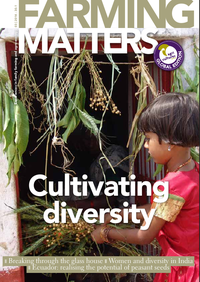In: Farming Matters | 30.1 | March 2014
As this issue of Farming Matters illustrates so impressively, the world is witnessing an explosion of popular initiatives and experiences to use, save and develop agrobiodiversity. At GRAIN we also see this happening. Seed saving projects, seed festivals, community seed initiatives and exchange networks are mushrooming everywhere. This is both extremely encouraging and dearly needed.We can’t count on governments to help us with the tremendous task of keeping biodiversity alive. They tend to move in the opposite direction as they facilitate the corporate takeover of seed and animal breeding, and promote industrial farming.
Some 20 years ago, many of us were excited when the Convention on Biological Diversity, the Biosafety Protocol and the International Seed Treaty were signed. But none of them have contributed much to keeping diversity alive in the fields. The Seed Treaty is now almost exclusively focused on gene banks, and mostly serves corporate plant breeders. The Convention on Biological Diversity became a tool for governments to turn biodiversity into a commodity under the banner of access and benefit sharing. And governments use the Biosafety Protocol to adopt biosafety laws that permit rather than prohibit GMOs.
All of these agreements talk about the rights of farmers and indigenous communities, but these were never implemented, and never will be. Instead, in many parts of the world, governments are now pushing restrictive seed legislation that gives intellectual property rights to corporations while outlawing farmers’ traditional role in maintaining diversity on the farm.
Peasants are keeping agrobiodiversity alive, but their survival is under threat from the rapid expansion of industrial farming. Driven by the powerful food and agro-fuel industries, the world is turning over its fertile farmlands to grow commodities that don’t feed people. In the past fifty years the amount of land dedicated to just four crops – soybeans, oil palm, rapeseed and sugarcane – has tripled. They now use an extra 140 million hectares of fields and forests where small farmers used to live. This amounts to just a bit less than all the farmland in the entire European Union.
We can only save agrobiodiversity if we save peasant farming. Global farmer movements such as La Via Campesina are trying to do precisely that by advocating food sovereignty. Food sovereignty promotes the use of agro-ecology, biodiversity, local markets and indigenous knowledge. It pushes for agrarian reform, fights against the industrial food system and global trade and puts local food producers centre stage again.
Unless we all join and win the battle against the industrial food system and for food sovereignty, local agrobiodiversity initiatives won’t stand a chance of surviving. At most, they will become isolated pockets of interesting experiments in a world of uniformity, controlled by corporations.
